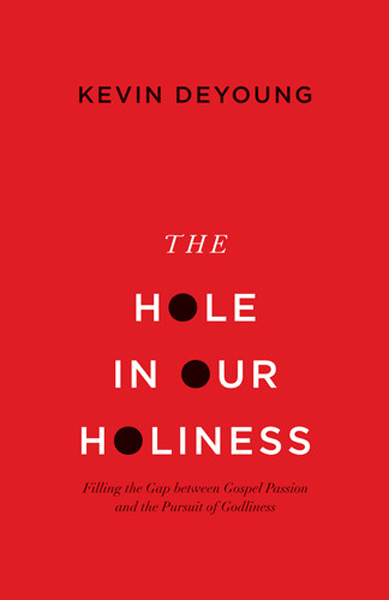Hole in Our Holiness by Kevin DeYoung: A Review (K. Sanders)
 The Hole in Our Holiness: Filling The Gap between Gospel Passion and the Pursuit of Godliness by Kevin DeYoung is a book that seeks to biblically answer the many questions surrounding the personal holiness of the Christian. In an evangelical culture where the phrase ‘Gospel-Centered’ is pasted on many book covers and church descriptions, DeYoung wrestles with what Gospel-centrality means and doesn’t mean for the pursuit of holiness.
The Hole in Our Holiness: Filling The Gap between Gospel Passion and the Pursuit of Godliness by Kevin DeYoung is a book that seeks to biblically answer the many questions surrounding the personal holiness of the Christian. In an evangelical culture where the phrase ‘Gospel-Centered’ is pasted on many book covers and church descriptions, DeYoung wrestles with what Gospel-centrality means and doesn’t mean for the pursuit of holiness.
DeYoung begins the book to show that there seems to be a gap in Christians today, particularly young Christians, between believing the truth of the Gospel and living holy lives. He uses the helpful illustration of his feelings towards camping. He lives in an area where everyone camps. DeYoung, while acknowledging that camping is for some people, does not like camping. This, according to DeYoung, is how many seem to view personal holiness; as something for certain people but not for everyone.
DeYoung goes on to say, “My fear is that as we rightly celebrate, and in some quarters rediscover, all that Christ has saved us from, we are giving little thought and making little effort concerning all that Christ has saved us to.”
With this, DeYoung begins to lay a foundation for the importance of personal holiness as seen in the scriptures (Romans 16:19, Revelation 21:8, Hebrews 12:14, etc).
For the remainder of the book, DeYoung fleshes out what personal holiness looks like. He looks at the purpose of salvation in Chapter 2, showing that the saved are to display Christ to the world through holy living. In chapter 3 he clearly shows what holiness is not and what it is according to scripture. Chapter 4 may be the most important chapter in the book. There DeYoung deals with a proper reading of the imperatives and indicatives of Scripture. He shows that the whole Bible, including the law, is important for Christian living. DeYoung puts the law in it’s proper place, showing that “the good news of the gospel leads to gracious instructions for obeying God.”
Chapter five shows pleasing God as an important motivation for personal holiness. Chapter 6 describes tackles proper motivation and place of the effort of the Christian in holiness. Chapter 7 deals with the oft neglected doctrine of union with Christ as essential for personal holiness. Chapter 8 directly addresses with sexual immorality and the Christian life. In Chapter 9 DeYoung shows the difference between union with Christ and communion with Christ, showing the necessity of cultivating a life of abiding in Christ. Chapter 10 ends on an encouraging note as DeYoung reminds the reader that personal holiness is a slow progression over time.
DeYoung writes very clearly. He is obviously a well educated theologian, but he labors to make difficult doctrines clear for the common reader. This is seen most clearly in his chapter on union with Christ. He follows the Puritan’s he commend in Chapter 1 by showing the necessity of deep thinking for proper living and, in this case, for personal holiness.
Another strength is the Biblical approach to applying the gospel that leans neither toward legalism or licentiousness. It is a temptation among many to ignore the imperatives (‘do this’) of Scripture as if the gospel was only in the indicatives (‘you are this’). DeYoung clearly shows that there are many motivations to holiness that we find in the Scripture. While justification is the first and foremost motivation, it is not the only motivation. Other motivations include the pleasure of God, the promises, and the warnings of the Bible.
DeYoung’s chapter on sexual immorality is necessary in our Christian culture today. He addresses head on one of America’s greatest idols. He shows the particular sinfulness of sexual sin while giving practical advice for Christians, especially young ones, who are struggling.
The final strength of the book is the study questions given for each chapter. This book will be a great resource for one-on-one discipleship, small group settings, youth groups, etc. DeYoung’s questions for further study help the reader press deeper into the issues and apply the truths to personal life.
The only critique of the book is that DeYoung’s claim that Christian’s today do not care much about holiness could have been better supported by some outside sources. There is much background surrounding this book that may have helped to shed light on the concern. DeYoung and Tullian Tchividjian had a helpful blog exchange over some of the issues that concern DeYoung, including motivations for Christian living, justification, sanctification, etc.
Showing some different perspectives would have bettered the book.
Overall, The Hole In Our Holiness fills the gap between Gospel passion and our pursuit of godliness by giving a sound biblical understanding of sanctification in the Christian life. It is very accessible for Christians of all walks of life and is a great tool for growing in godliness.
~ Kevin Sanders, Student
Reformed Baptist Seminary